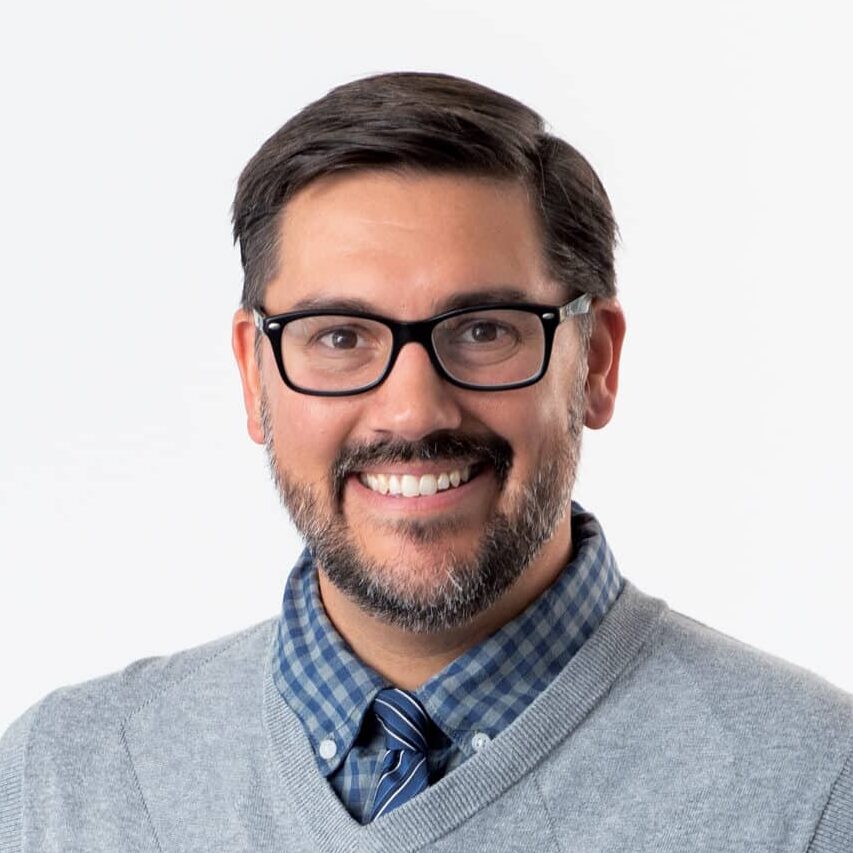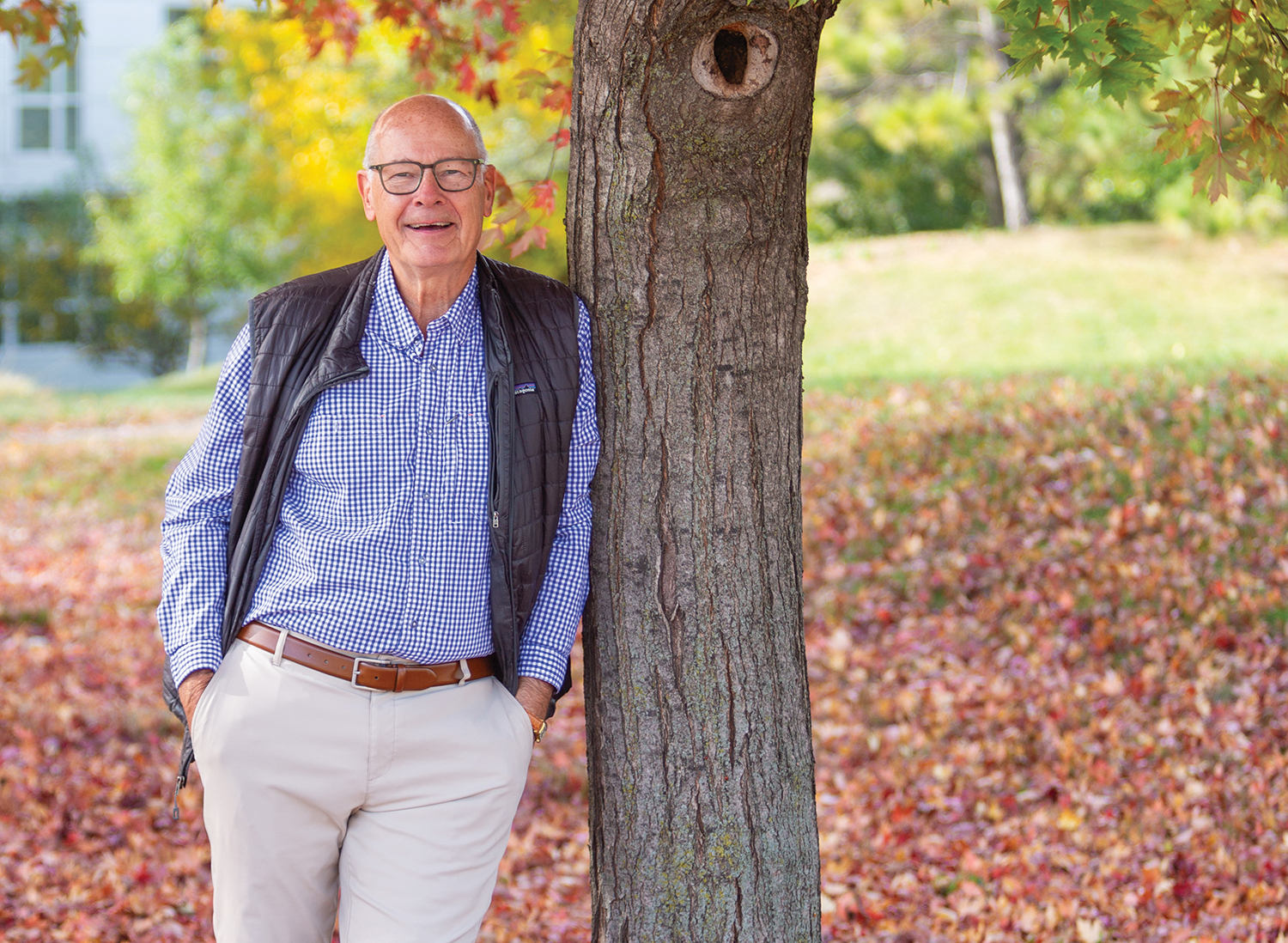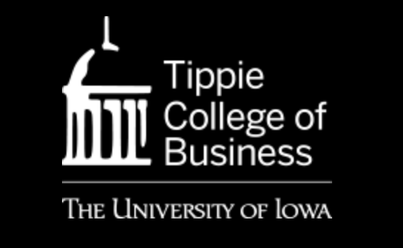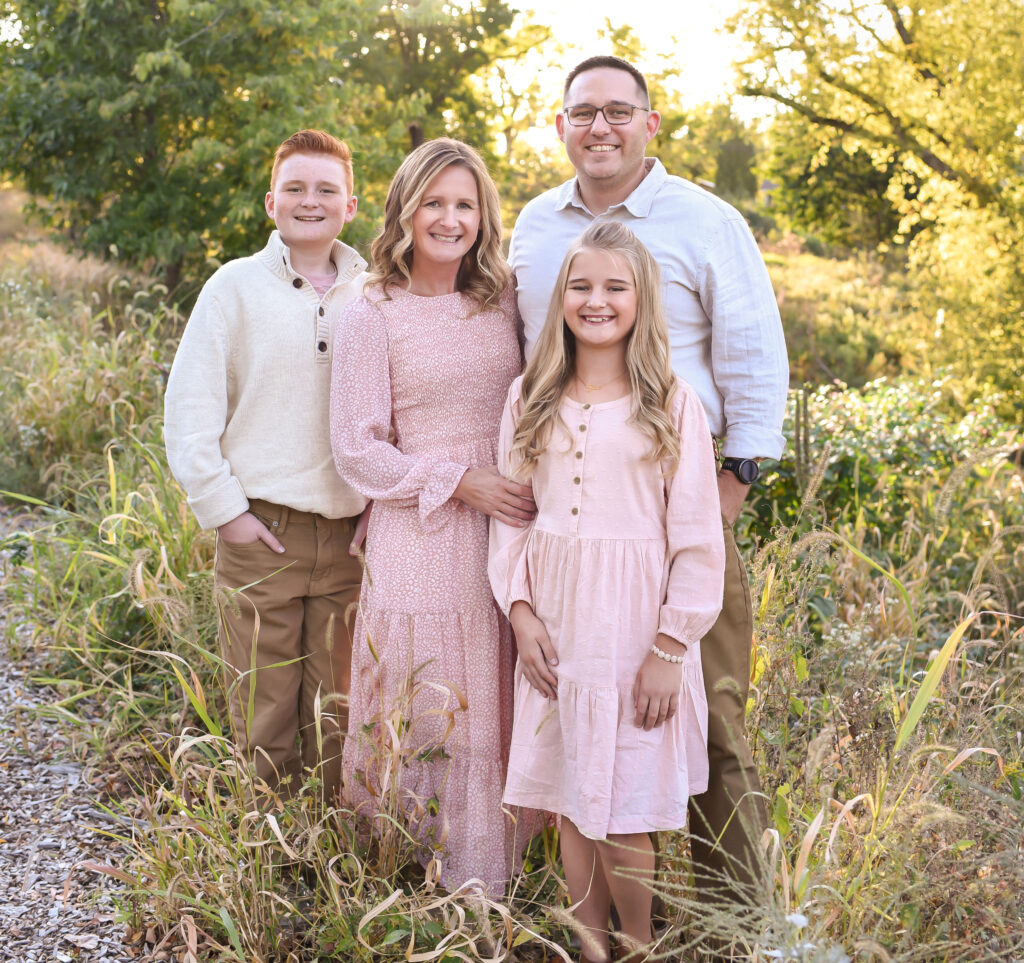‘An important part of my origin story’
Retired news anchor, journalist Harry Smith reflects on time at Central College, teaching curiosity

Harry Smith’s 40-year career in journalism, the majority serving as an anchor and reporter for NBC News and CBS News, took him around the world.
He’s interviewed U.S. presidents, global political figures and celebrities and told the stories of unseen and everyday people.
In March, when Smith announced his retirement on NBC’s “Today” show following 12 years with the network, the Lansing, Ill., native told his colleagues and audience that he was going back to his alma mater Central College in Pella to teach a class on curiosity for the fall semester.
“I have also felt like I’ve owed this place an enormous debt. … I don’t think it could ever be fully repaid,” Smith told the Business Record. “It’s such an important part of my origin story.”
The class is titled “Commencement: The Beginning.” Smith’s goal in the pass/fail seminar is to introduce Central juniors and seniors to additional academic and pedagogical materials to enhance their liberal arts education and help his students become more adaptable once they’ve entered the workplace.
“It’s such a different class,” Smith said. “In order to become a certain something or in order to say you have a major in something, there’s a certain amount of material that you really have to ingest and then be able to say you have command of it. I’m not asking for that at all. I’m asking you to think.”
Smith, who serves on Central’s board of trustees, said he was motivated to participate in the college’s executive-in-residence program by two of his fellow board members — Cultivation Capital general partner Rick Ryan and retired Caterpillar Financial Services Vice President Clay Thompson.
The Central class of 1973 alumnus started his professional journalism career at radio stations in Denver, Colo. He transitioned to public television and then to Denver’s CBS affiliate. He joined CBS News as a reporter in 1986. He hosted CBS This Morning and the Early Show for 17 years, and worked as a substitute anchor for the CBS Evening News, Face the Nation and CBS News Sunday Morning.
A multi-Emmy award winner, Smith started at NBC in 2011.
Smith has interviewed some of the most powerful and influential figures of the 20th and 21st centuries, but he said he’s always been drawn to a more personal kind of storytelling.
“My preference is the person whose name has never been in the paper,” he said.
While delivering a keynote address in May to the Greater Des Moines Partnership’s annual 2024 DMDC trip in Washington, D.C., Smith said he worked through the Dyersville Area Chamber of Commerce in 2021 to tell more intimate stories connected with Major League Baseball’s preparations for the Field of Dreams game.
He was looking for the angles not being explored by other national media.
“My whole thing for years has been where’s the side door? I don’t want to go in the front door at the start of a story. Is there a backway? Maybe there is a hidden passage,” Smith said.
Smith’s story in 2017 on Elmore Nickleberry and two dozen other surviving Memphis, Tenn., sanitation workers who received $70,000 grants from the city 50 years after they were denied higher wages and better working conditions before striking in 1968 has stayed etched in the reporter’s mind.
“Would I rather be sitting in the White House face to face with the president of the United States or talking to Elmore Nickleberry? I’d rather be in that Memphis kitchen any day of the week,” Smith said.
His ties to journalism in Iowa have expanded in recent years working with the Western Iowa Journalism Foundation and in the nonprofit’s effort to maintain access to accurate local news and investigative reporting for western Iowa.
Smith sat down with the Business Record on Oct. 24 at the Geisler Library on Central’s campus to discuss how his time in Pella influenced his career, family, the state of liberal arts education and his desire to teach a college course on curiosity.
This interview has been edited and condensed for clarity and brevity.
You started your career in local radio here in Marion County.
I did write a lot of commercials for D&D Pump and Pipe. Then, a veterinarian here [in Pella] who died many years ago in the ’70s, I think maybe right around the time I was graduating, he and I would do girls’ high school basketball games — the old six-on-six. He did the play-by-play, and I did the color. KNIA was a daytime station at the time. And so we would go to the games in the evening and record them on a reel-to-reel tape recorder, and they would play them back the next afternoon. Everyone knew the score already because word would spread. This is pre-internet. Everyone knew the score, but they wanted it. … It’s sort of like small [news]papers, right? Small local papers. …You want to be able to clip that newspaper or hear your granddaughter’s name on the radio when she makes that set shot.
You had that experience on local radio. How does a college kid at Central translate that into a 40-year career in journalism leading national news broadcasts and programs?
I didn’t know what I wanted to do when I graduated. I really thought about going to seminary, to go into divinity school. I thought about that hard. [I] really thought hard about going to graduate school in communications as a social scientist. I was really interested in words and the power of words. A guy I knew here at Central was working the all-night shift at an AM [radio] station in Denver, and he heard I was coming to town. He said, “We’re looking for somebody to do the FM side,” and the pay was $2.50 an hour. I wanted to do it, but the other part of it was my father … I grew up in a town south of Chicago. It was a town back then; it’s a suburb now. And in this town, it was all people and industry to the north and to the east. To the west to the south, it was farms and forest. Just outside of town, there were these old truck farms, big vegetable farms. I was in junior high school, and my father said one day, “Do you know what you’re doing tomorrow?” I said, “No.” And he says, “I do.” And I went to work on those farms. And I worked on those farms every summer from junior high school to my sophomore year in college. That was six days a week, sometimes 80 hours. Really, really, really crazy dark, loading trucks. It was endless. It was really hard, and of life lessons I learned in that, one was learning a work ethic. You may not love this, but if you bust your hump and get good at it and take some pride in it, you’re not looking at the clock all the time. That’s an amazing lesson to learn. I also learned that, if possible, I didn’t want to do that all my life. Here’s this radio job. I’d screwed around at the college radio station. I did this stuff at KNIA, I’d competed in speech in high school for a while, and I thought if I could just give this a try and see what happens because if I need to go work, I know how to work. I can always go work.
It’s interesting to me as a journalist that your wife is Andrea Joyce, Olympics reporter for NBC Sports Group. Talk about what it’s like having two journalists in one household and what your family has meant to your life and career.
I retired in the spring, and Andrea was covering her 17th Olympic Games. And add to it that she was inducted in the Sports Broadcasting Hall of Fame last December, one of [only a few] women [who have been inducted]. She was going to cover her 17th Olympics and everybody said, “Oh, are you going to go? Are you going to stay with Andrea when she’s covering the Olympics?” When she’s working, you don’t stay with her. We learned that a long time ago, because when she’s working, she’s working and what she doesn’t need is me saying, “Hey, I’m meeting friends for dinner at such and such in Paris tonight. As it turns out, she had a lighter load this year, and I stayed with friends who had a big Airbnb on the outskirts of town, and I saw her for dinner twice. I just stayed for a long weekend. But her focus is so intense, and she’s beyond dutiful. Whatever assignment she gets, she’s going to crush it. It’s out of respect for that and not being in the way of that, you just don’t stay with her. We will try not to occupy the same space.
If you have a more intensive interview or story, do you operate the same way?
I’d always had an office to kind of escape to. She never had to report into an office. She’s reported as a freelancer from the US Open for years. During the summer she’s watching just tons of tennis. She has a little TV on with some tennis from some far-flung place. She’s got a laptop out. She’s got an iPad. She has stacks of legal pads. She has stacks of cards. And if I would come home from the office and see that, I would just step back in the other direction and wait in another part of the apartment until she was finished.
What about the rest of your family? How did they affect what you did for a living and how you tell stories?
There was a time when I was on morning television and she was starting out at CBS, we were both on the road a lot, and the pledge that we made back then was that one of us would always be home. So sometimes there’d be one of us in a cab going to the airport while someone else was coming home from the airport. But I think over all those years, we could count on one hand the number of times that we weren’t home. That was the pledge that we made to each other. People thought we were crazy and were a family like any other family. It would take somebody else to judge if we were successful or not, but we sure worked hard.
After a 40-year career in journalism, why return to your alma mater at Central College to be an executive-in-residence and teach? How did the opportunity come about?
I think Central College has a lot to do with my origin story. I had to get really good grades my senior year in order to project eligibility [for football]. I had a very, very good senior year playing football, and so I was on a number of all-star teams and all-conference teams at a 2,000-student high school in suburban Chicago. A lot of what I call directional schools in Illinois had me come up for a visit — Northern and Western Illinois. Western Illinois offered me a full-ride scholarship, but I was a very churched kid. I grew up in the Reformed Church, the old Dutch Reformed Church. I came here and I met Ron Schipper, the legendary coach. And I thought, “This will probably be better for me if I come to this church-related school, and I really like this Schipper guy, I’ll play for the Schipper guy.” That seemed like a really good idea. When I got here there was an expectation of performance in the classroom.
I don’t know if this is my own myth or not, but I’d get homework in high school and go, “Oh God,” and just closed the book. There was no internet back then, but one of my brothers had sold encyclopedias, and I had a set of encyclopedias in my room. I’d turn on the radio — I’d gotten a few dollars for my eighth grade graduation, so I bought an FM radio. I would turn on the radio very softly and sit and read the encyclopedia. That’s how I spent my high school. I got to college, and there’s this expectation. I said, “I’m going to take econ, and I’m going to take theology, and I’m going to take sociology, and I’m going to take psychology, and I’m going to take everything that isn’t nailed down. And so that was my experience here, and I loved every second of it.
So that love of school and those formative experiences are what made you return to Central when you were done at NBC?
I have always felt like I’ve owed this place an enormous debt. I’ve been on the board here forever. It’s the most important thing that we do philanthropically in our family. I’m certain it’s a debt. … I don’t think it could ever be fully repaid. I’ve always thought I might teach, but I didn’t think for the longest time I would teach here. I came back to Pella a couple summers ago to attend the funeral of Ken Weller, who was the president here for years. His first year as the president was my freshman year, and I got to know Ken really, really well. I came back for his funeral, and after I listened to speaker after speaker over 90 minutes, I said, “If I’m going to teach, I should teach here. And I walked over to [Central College President] Mark Putnam when the funeral was over, and I said, “Mark, I’m going to come back here and teach.” And he said, “OK.”
You said in Washington, D.C., the class you’re teaching is about curiosity. Can you talk about the characteristic of curiosity and how that benefitted your career as a storyteller and a journalist? How do you introduce that as an essential trait to the students that you’re interacting with now?
It’s a lot of different ways. There is a pedagogical part to this. We have them reading Adam Grant, who’s an organizational psychologist from [the University of Pennsylvania’s Wharton School], who is voted every year the best professor there. He writes bestselling books, and he collects research that you just read and say, “God, that makes sense.” This week, the [class] section was listening to or watching a lecture by Ellen Langer, who is a psychologist at Harvard [University], and she talks about a lot about mindfulness without meditation. And one of the things we understand, especially about big corporations, is they’re looking for people who are curious. They’re looking for people who can do the job but are they curious enough to be malleable enough to adjust to the fantastic changes in the workplace that are happening every minute? Did we really anticipate how AI was going to land on our doorstep and what the effects were going to be? We still don’t understand, but we’re working with people who have all that on their minds and everything else.
I talk about curiosity a lot, but the other part of that we talk about is malleability and adaptability. Andrea was here during homecoming, and she sat in on the class, and we talked about the story of how she had been a weekend anchor in Detroit — local girl makes good at the University of Michigan, angel scholar. She gets a job offer to come to Denver to anchor the five and 10 o’clock news. She came to the station I was working at, signed the contract. A week goes by. Another week goes by, another week goes by, and they said, “We’re not giving you that job.” That’s what happens in real life. And how do you adapt to that? How do you adjust? Do you say, “Well, screw this, I’m out of here,” or do you say, “All right, I’ve signed a contract. I’m going to crush whatever availabilities are here, and I’ll figure out what to do next as I’m making everybody appreciate the fact that I’m here doing the job I’m doing.”
I think it’s life skills, but I think it’s life skills/workplace skills. … This [course] is about critical thinking. This is about discernment. This is about really being able to make informed judgments. We go through this material, but in my course description, I said class participation is mandatory. They have to be able to talk about this. When they read it, what’s your response to it? Are you buying it? Are you selling it? And every day I come in and I say, “You can buy this stuff or not buy this, but you need to understand it because I want you to have some tools in your toolkit when you go out the door at the end of graduation that you might not have had otherwise.”
Viewpoints have shifted some on liberal arts degrees. What do you think of the importance of a liberal arts education in today’s economy? How do you see its role in U.S. society moving forward?
Critical, absolutely critical. One of the things we know is that half of the kids who graduate from college now will never, ever, ever, ever work one second in their field of study. Part of my motivation, I observed during years on the board here, is students and parents, guess what? You’re responsible for this in a big way because the cost is so high. So we better know … there’s a job at the end. The focus has become more and more narrow, and at the end of the day, I think that’s shortsighted. You’ll say, “I’ve done this study, I have this major, I’ll get this job.” And in certain cases, if you’re going to become a doctor, there are some other jobs that actually require that kind of focus. … My whole thing is you need to know how to write. If you don’t take some English courses, if you don’t take some writing courses, you’re selling yourself short. Because I don’t care if you’re an actuarial, you’ve got to be able to communicate with your peers. … Can you communicate? That’s part of what we’re doing in this class. I want them to talk, to say out loud what they think.
I want to shift back to your career for a bit. You mentioned Russian opposition leader Alexei Navalny earlier. It was over a decade ago you interviewed him. Since his recently reported death in an Arctic prison and now his memoir posthumously coming out, how does that interview replay in your mind now knowing what his fate is? Do you think of it in the same way?
I asked him if he was worried about his safety, and he said no. I thought to myself when he said it because we put that answer on television, but I thought to myself, “You know better.” [Anna] Politkovskaya, a well-known reporter in Moscow, had already been killed. It was routine that if you were upsetting the system, ultimately something really bad was going to come to you, or you were going to leave the country. And it just was the truth. You know, he kind of laughed it off, but I kept thinking to myself, this guy is really smart. He’s whistling in the graveyard. He knows what’s what.
How did you land that interview?
It’s really pretty easy, because I read. I read like crazy, and I didn’t see his story on television anywhere. And I’ve always been interested in Russia. I really wanted to take a job. I’d been a course correspondent at CBS for a couple years, and the Moscow bureau job came open. We’d already had a conference call with the reporter who was leaving. I had taken Russian in high school, believe it or not.
Can you carry a conversation?
Now? If I’m in Moscow and I keep looking at the Cyrillic for a day or two ,I can start reading it again. …You have interesting turns in your career, and that was really kind of where I was going. And they called and they said, “We want you to anchor the morning show.” And I was like, “I don’t want to go. I don’t want to go. I want to go to the field. I love the field.” And the whole time I was an anchor, I was always jumping on planes, always trying to get in the field, and especially when there’s breaking news. We used to come here and do the Iowa caucus like nobody’s business.
The course you’re teaching is just this one semester. What’s next for you?
It doesn’t even last the whole semester. It lasts a couple of months. … I still have those books that I said haven’t cracked. I keep thinking I’ve got something to write. I’m going to become reacquainted with my dog and my wife and my sons and their girlfriends. Really looking forward to that. I miss them. I’ve been home twice since Labor Day. I am so happy I did this. It’s so unbelievably rewarding to me.
Photos submitted by Central College
At a glance
Hometown: Lansing, Ill.
Career: 40-year journalist, anchor and reporter for NBC News and CBS News; currently executive-in-residence at Central College in Pella.
Family: Wife, Andrea Joyce; two sons
Recommendations and favorites:
Book: “Gilead” by past Iowa Writers’ Workshop faculty member Marilynne Robinson
Artist: Johannes Brahms
Food: “A great slice of pizza” with ingredients sourced and cooked by his son in their wood-burning pizza oven.

Mike Mendenhall
Mike Mendenhall is associate editor at Business Record. He covers economic development, government policy and law.














